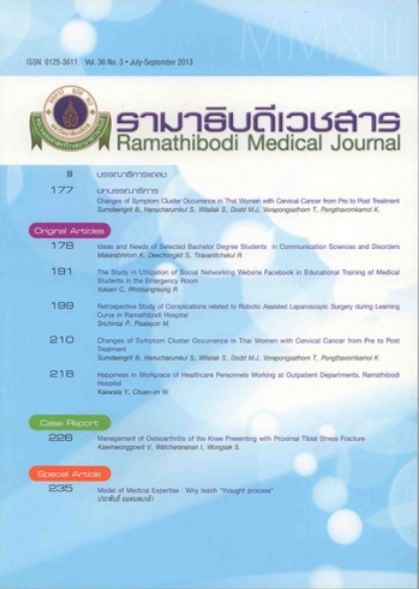Ideas and Needs of Selected Bachelor Degree Students in Communication Sciences and Disorders
Main Article Content
Abstract
To survey information on the ideas and needs of selected Bachelor degree students in the Communication Science and Disorders program on teaching and professional knowledge by using an internet questionnaire. Collecting, grouping and classification data were analyzed in terms of descriptive, one-way ANOVA and Scheffe’s test statistics.
Fifty nine subjects aged 26.6 years were studying in the third, fourth year and 2 year degree (ongoing). Thirty three and 26 subjects majored in Audiology and Speech pathology, respectively. About 70% of the participants were fairly proficient in English. About 76% of the subjects would like to work for the Thai government after graduation. Results showed the students’ needs at the highest level were the practicum with the testing instruments and the professional knowledge. At the higher level needs were participation in learning evaluation, teaching and learning outside of the class, and support in learning with Thai text books. The students’ expectations were judged to be at a higher level because of their positive attitude toward teaching, learning, and profession standards. Their ideas and needs were statistical significance for different age groups.
These results could be used to determine the direction of quality assurance in education and to be an effective guide line for personnel production according to the strategic plan for manpower of the National Health Workforce.
Article Details
References
Jindawattana A, Noree T, Pagaiya N, Sirikanokwilai N. Strategic Plan of National Health 2007-2016. Bangkok: National Health Commission Office; Human Resource for Health Research and Development Office, Strategy and Planning Division, Ministry of Public Health; 2007.
Ministry of Public Health; 2007. Strategy and Planning Division and Human Resource for Health Research and Development Office. Human Development Report 10 Years. Bangkok; 2008.
Gullayanon C, Suphawatjariyakul R, Makarabhirom K, W Wilainam, Saengrattanayon D, Lertsukprasert K. Human Development 10 Year for Communication Disorders Program. Bangkok; Strategy and Planning Division, Ministry of Public Health; 2009.
Strategy and Planning Division and Praboromarajchanok Institute for Health Workforce Development. Predicting the demand of health care workforce in two decades. Bangkok; 1997.
Office of the Basic Education Commission, Ministry of Education. Manual of Curriculum and Teaching Development. Bangkok; 2010.
Katpiyarat P, Vikromprasit S. Study the Satisfactory Levels of the Graduates with Undergraduate Program Business Administration, Faculty of Management Science, Uttaradit Rajabhat University; 2010.
Malithong K. Contemporary Educational Technology. Bangkok; Chulalongkorn University; 1997.
Phupan S. Basic Concepts for Creation and Development of Curriculum in the Thai Education Reform. 2006.
Panich V. 21st Century Learning Framework. Bangkok; Sodsri-Saridwongso Foundation; 2011.
Wata J. Knowledge management of teachers. Withayajarn. 2007;106:18-21.
Nangam C. A Study of Problems With Studying and Teaching English 1 as Perceived by Engineering Students and Instructors at Rajamangala University of Technology Thanyaburi [master’s thesis]. Srinakharinwirot University; 2008.
Siriwannabood P. Theory of Developmental Psychology. Bangkok; Chulalongkorn University Press; 2004.
Suwannakhot N. The Adjustment of the First Year Undergraduate Students at Naresuan University [master’s thesis]. Srinakharinwirot University; 2010.
